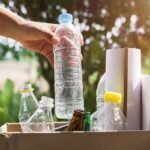
Water conservation is the practice of using water efficiently to reduce unnecessary usage. It includes all the policies, strategies, and activities to sustainably manage the natural resource of fresh water, to protect the hydrosphere, and meet the current and future human demand.
Many factors including climate change have increased the importance of conserving natural water resources, especially in manufacturing and agricultural irrigation. Many cities and countries have already implemented policies aimed at water conservation.
Importance of Water Conservation
Less than 1% of the water supply on earth is fresh water and up to 69% of that freshwater supply is consumed by the agricultural industry. 2% of the global water supply is trapped in icebergs and the rest of 97% is salty water.
The population is projected in the next 30 years to grow to over 9.5 billion. Water Conservation is important since clean and fresh water is a limited resource.
Water conservation allows regions and cities to plan the use of water resources more efficiently in the future.
Note: The average person uses up to 152 gallons of water per day, compared to only 39 gallons used per day in the UK, 23 gallons per day in China, and 4 gallons per day in Ethiopia.
Benefits of Water Conservation
Here are a few of the importance key benefits from saving water:
- Save money on household utilities.
- Protects fresh drinking water resources
- Minimizes water pollution and health risks
- Reduces the need for costly water supply and new wastewater treatment facilities
- Maintains the health of aquatic environments
- Saves energy used to pump, heat, and treat water
- Reduce harmful land erosion caused by agricultural irrigation.

Ways to Do Water Conservation
Installing water-saving appliances and fixtures: This could potentially save 40,000 gallons per household per year and create savings of 30% on annual water bills.
Check for leaks. Fix leaks, including leaky toilets. Even the smallest leaks add up over time. Check study utility bills. By EPA estimate, household leaks in the US can waste approximately 900 billion gallons (3.4 billion cubic meters) of water annually nationwide.
Turn off water when brushing teeth or shaving. A running tap can waste more than 6 liters of water a minute!
Plant drought-tolerant/resistant plants and trees. If you live in places where summer gets too hot it may be a good idea to consider planting more drought resistance plants.
Improve water system assessment and maintenance
Use rainwater. You can collect rain water and use it to water your plants, clean your car and wash your windows.
Use a broom to clean driveways, patios, and sidewalks instead of water from a hose.
Use mulch and bark in your garden, it will help to reduce evaporation by up to 75%.
Do not use tap water to water your lawn.
Avoid toys that need constant running water.
Turn off the sink while soaping up your hands when washing hands.
Water your outdoor landscape earlier in the day when temperatures are cooler
Rather than running the tap when cleaning vegetables, wash your vegetables and fruits in a filled container. Reuse it to water outdoor plants. Reusing water from rinsing out the coffee pot for outdoor plants, the compost or lawn is something we do all the time. This could save over 200 gallons of water every month.



